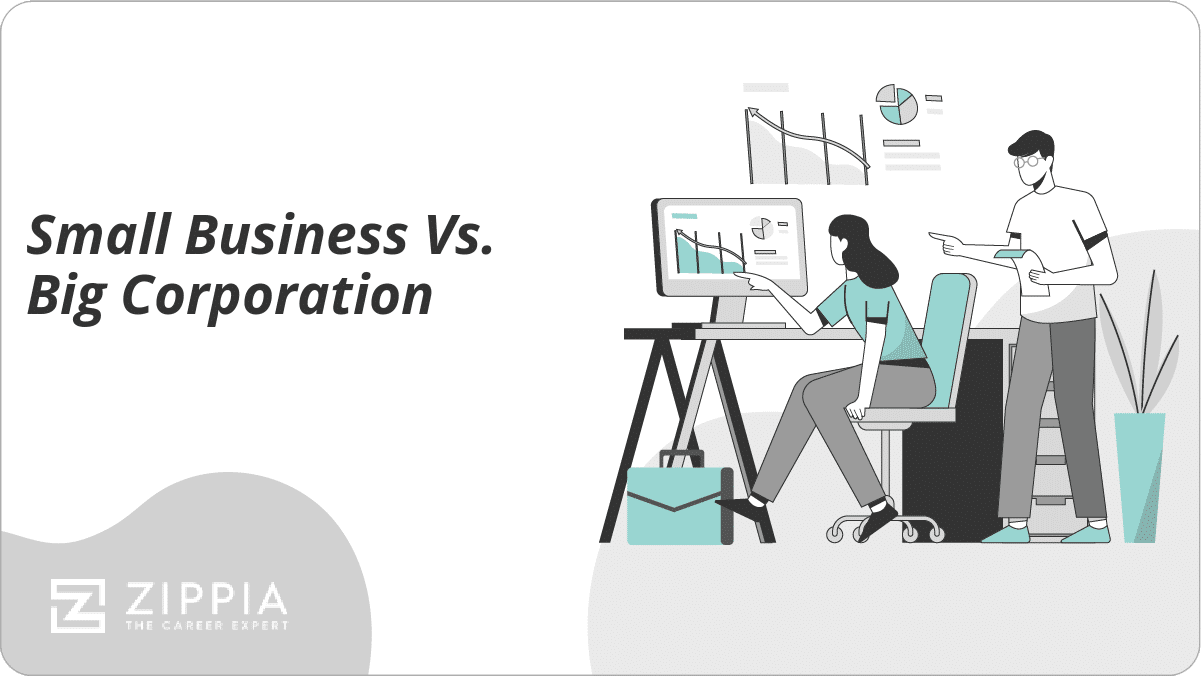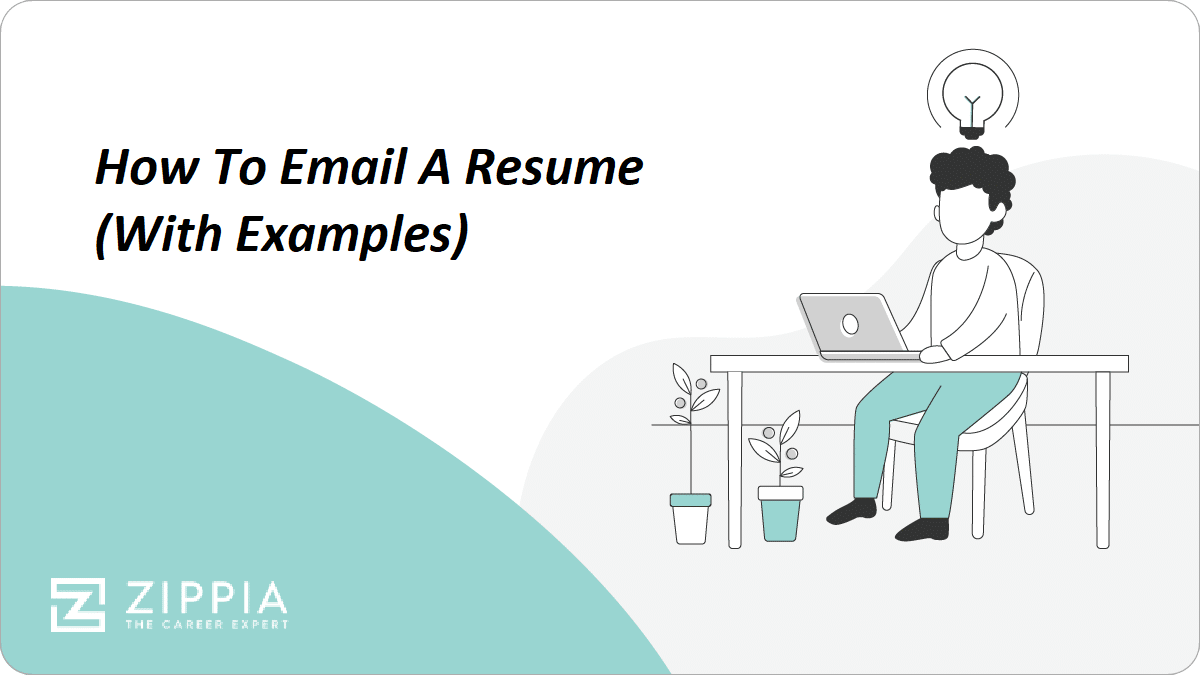- Job Application Tips
- About Me Page
- Answering Machine Messages
- What To Bring To A Job Fair
- Free Job Posting Sites
- Email Sign Offs
- Job Scams
- How Long Does It Take To Become A Doctor
- How Long Does It Take To Become A Vet
- Government Programs That Help Felons Get Jobs
- How Long Does It Take To Become A Dentist
- Relocation
- Job Search Spreadsheet
- Right To Work States
- How To Research A Company
- How To Change Careers
- What To Do If You Have No References
- Working For a Big Company Vs. A Small Company
- Writing Sample Format
- How Long Should A Writing Sample Be
- How To Get A Job Fast
- How Many Jobs Should I Apply For
Find a Job You Really Want In
Deciding what kind of company you want to work for is an important step in the job search. Depending on your qualifications and experience, your career goals, and the industry you’re seeking employment in, you might consider working for either a small business or a large corporation.
Everything from the hiring process to training and daily job responsibilities depends heavily on the size of the company you’re employed with. Determining which work environment you’ll be most successful in is a key step in getting hired, being happy at work, and reaching your biggest career goals.
Aside from physical size, net worth, and labor force, many characteristics differentiate a small business from a big corporation.
Weighing the pros and cons of working at large and small companies and identifying which is best suited for your personal and professional goals will help you target your job search and find your dream job.
Key Takeaways:
| Small Business | Large Corporation |
|---|---|
| The definition of a small business can vary, but generally ranges between 100 and 1,500 employees and/or makes less than $40 million in revenue. | Large corporations are companies with a corporate model that are not classified by the Small Business Administration. |
| Small companies offer less bureaucracy and more direction communication within the company. | Large corporations are beholden to bureaucracy and more complicated channels of communication. |
| A small company offers a more personable learning environment. | Working at a large corporation can feel impersonal and less connected to the company’s mission. |
| Small companies have limited resources and leverage. | Large corporations offer more resources and leverage. |
| Small businesses may be less structured and provide less order in workflow. | Large corporations can be more structured and ordered. |

What Is A Small Business?
A small business can have a variety of definitions based on its industry, the number of employees, and the amount of revenue it generates.
The United States Small Business Administration (SBA) provides definitions that correspond with the North American Industry Classification System (NAICS). These definitions are found in the SBA’s Table of Size Standards and vary based on industry.
Some industries are considered small businesses when they employ fewer than a certain amount of people, while others are considered small when they make less than a certain amount of revenue.
Employment numbers of small businesses range between 100 and 1,500 employees. Revenue numbers range from $1 million to over $40 million.
Choose From 10+ Customizable Resume templates
Zippia allows you to choose from different easy-to-use resume templates, and provides you with expert advice. Using the templates, you can rest assured that the structure and format of your resume is top notch. Choose a template with the colors, fonts & text sizes that are appropriate for your industry.
Pros of Working for a Small Company
Small businesses have certain advantages that you won’t often come across at larger companies. Here are the top five perks of working for a startup or small company:
-
Less bureaucratic. Small and local businesses are far less bureaucratic than big businesses, such as some of the largest corporations in Iowa.
While large corporations generally have lengthy and complex administrative procedures, small businesses tend to operate more simply and have fewer hoops you have to jump through.
Since small businesses have more straightforward and simple structures and policies, they can be exceptionally easier to navigate since you won’t have to go through many bureaucratic procedures to get your work done.
-
Bigger learning opportunities. As the name suggests, small businesses are small. This means they usually have a smaller payroll and earn less annual revenue than bigger corporations. Since small business owners employ fewer employees, they often look for staff to take on multiple roles within the company.
Working in the small business sector will undoubtedly expose you to a wider array of job functions. By having work responsibility at work and gaining experience in areas outside your immediate expertise, you’ll become a more well-rounded professional.
-
More personable work environment. Many small businesses are close-knit or family-run companies. This friendly and welcoming work environment is much more personable than the sometimes cold and stale work environment of larger corporations.
Instead of spending your days in a cubicle or getting lost in the corporate ladder of a big business, at a small company, you’ll get to know the people you work with and have ample opportunity to build your professional network and curate great relationships with your colleagues.
-
Better working conditions. Since smaller enterprises have fewer rules and bureaucratic procedures than large companies, entrepreneurs and small business owners often go out of their way to establish a cordial work environment with great working conditions.
In this sense, small businesses offer employees more flexibility and an excellent work-life balance. Moreover, smaller businesses also typically allow employees additional creative freedoms since they’re usually more mission-oriented workplaces.
-
Mission-oriented work. Unlike big companies that may be solely focused on profitability and market growth, like some of the top ten largest corporations in Texas, small businesses place a higher emphasis on mission-oriented work.
In addition to making money, small business enterprises are also focused on things like environmental or social benefits, allowing their employees to engage in rewarding work and make a real difference in people’s lives.
Cons of Working for a Small Company
Although there are numerous advantages of working for a smaller company, there can also be a few drawbacks. Here are a few cons of working for entrepreneurs and small businesses:
-
Fewer opportunities for professional development. While there are plenty of learning opportunities at small businesses, there are considerably fewer pathways for professional growth and development. Since the company is so small, it can be harder to advance in your career or get a promotion.
Small businesses have lower turnover rates than larger companies, making it almost impossible to advance unless someone leaves or a new position is created. Unlike larger companies, small businesses typically don’t have any clear road maps to getting promoted.
-
Limited resources. Even the most profitable and best established small businesses tend to have limited resources when compared to their larger cooperatives. Smaller firms generate less revenue, which in turn limits their resources.
Limited resources could mean you have to work with old technology or software systems, have little opportunity for professional outside training, or have fewer benefits. In some cases, this may result in you having to purchase your health insurance or pay more out of pocket for employee benefits.
-
Fewer perks. Although this might not be a deal-breaker, smaller companies tend to have fewer perks than bigger firms.
For instance, many large companies, like Target, Best Buy, and UnitedHealth Group offer employees a range of insurance options, tuition reimbursement programs, on-site daycare options, and even an employee gym.
-
Limited stability. Small businesses can be less stable than large corporations since they don’t have the financial backing often necessary to offer employees solid job security. Large corporations, with bigger revenue streams, on the other hand, tend to be stable even when the economy falters.
Since small businesses generally don’t have access to cash revenues, they offer less stability and if you are laid off they generally don’t provide severance packages like larger firms often do.
-
Less structure and order. Depending on your work style and how you look at this, this can be good or bad. Small companies tend to have few structured policies and procedures in place compared to large businesses, which can sometimes make work difficult.
If you’re the type of person who needs a structured environment to be successful, then working for a small business may not be the best option for you. But, contrarily, if you enjoy doing something new every day and thinking freely instead of in the finance of organizational procedures, then a small business environment could be perfect for you.
How to Find Small Companies
Finding the small businesses that are right for you isn’t as hard as you might think.
By scanning local job postings and using resources provided by the small business administration, you’ll be well on your way to landing a rewarding job at a small business in the industry of your professional expertise.
Another great way to find small companies is by researching the best small companies in your area and understanding how you can qualify for a job with them.
For instance, the top three small companies in Nashville are JumpCrew, Edgenet, and Oryx, while the best small businesses to work for in Minneapolis include Object Partners, Celarity, and Field Nation.
Why You Should Think Small
As more and more people look toward small businesses to find employment and build their careers, there are more opportunities than ever before to land a rewarding and lucrative job within the small business sector.
Small businesses are growing fast, and with that growth comes increased hiring rates and the opportunity to earn a pretty decent salary with good employee benefits. In addition to financial stability, working for a small business will also allow you to learn new things, engage in rewarding work, and form lasting relationships with coworkers and company leaders.
This welcoming work environment makes employment with small businesses a particularly great option for recent college grads, young professionals seeking entry-level positions, and individuals changing careers.
Furthermore, the hiring and onboarding processes used by small businesses are also generally less taxing than those required of larger companies. Although you should still be prepared to answer traditional interview questions like “What do you know about our company?” you can expect the hiring process to be swift.
Today, labor statistics show that there is a real push for job-seekers to find employment with small businesses across the nation. More than 30 million small businesses operate throughout the United States, employing nearly 60 million Americans, a little less than half of the country’s workforce.
Final Thoughts
Choosing whether to work for a small business or a large corporation is a big decision. By considering your personal and professional goals and weighing the pros and cons outlined in this article, you’ll be well on your way to deciding which company is best for you and landing your dream career.
- Job Application Tips
- About Me Page
- Answering Machine Messages
- What To Bring To A Job Fair
- Free Job Posting Sites
- Email Sign Offs
- Job Scams
- How Long Does It Take To Become A Doctor
- How Long Does It Take To Become A Vet
- Government Programs That Help Felons Get Jobs
- How Long Does It Take To Become A Dentist
- Relocation
- Job Search Spreadsheet
- Right To Work States
- How To Research A Company
- How To Change Careers
- What To Do If You Have No References
- Working For a Big Company Vs. A Small Company
- Writing Sample Format
- How Long Should A Writing Sample Be
- How To Get A Job Fast
- How Many Jobs Should I Apply For

















